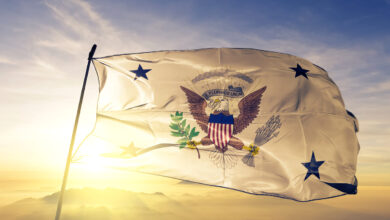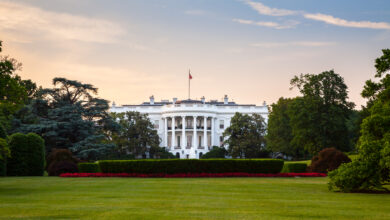
Women in the Military

It’s Memorial Day weekend! So it’s a special edition of the newsletter: women in the military. As a first, we’ve brought in a guest editor, Cristine Pederson. If you don’t know Cristine, you should. She served as a Corporal in the U.S. Marines, where she worked on counterterrorism. In 2017, she was chosen to be a Truman Scholar. She is currently pursuing a master’s degree at Georgetown. Last month, she wrote this piece about what inspired her to join the Marines and what she found there.While this special edition is focused especially on women in the U.S. military, it wouldn’t be complete if we didn’t give you some interesting points about women in the military around the world…
- China — Women make up about 4.5 percent of the People’s Liberation Army, or 53,000
- India — Women make up about 3 percent of the Indian army, or 36,000
- North Korea — Women make up about 40 percent, or an estimated 380,000
- Pakistan — About 4,000 women serve in the Pakistani military
- South Korea — 6,915 women serve in the Republic of Korea Army
- United States — The number of U.S. women serving is about 74,000, which equates to around 16%
- Russia — Women comprise 10% of the Russian Armed Forces, or around 35,000
Countries that have had a woman as defense minister, in the order that they’ve appointed them. Sri Lanka led way back in 1960. Oh, and many of these countries have had women serve as defense minister multiple times. The one country not on this list? Guess……

Women in the Military by Cristine Pedersen

One takeaway I have both from my five years of service in the United States Marine Corps and from my four years as a veteran is that women* who serve are more dynamic than most people assume. Women are not inherently more peaceful, but, instead, possess greater strengths in qualities that create and sustain peace.
To start, we are often are more resourceful, collaborative, and persistent. I don’t believe these are natural weaknesses of men, but instead, manifestations of rigid expectations of masculinity in society. “Strong men”, such as those I served and lived with, put a heavy emphasis on pride, honor, and brute strength.
At times I had the opportunity to sit in meetings well above my pay-grade because of my language abilities (I was an Arabic translator) and what I often found was that most miscommunication was not across cultural or ethnic lines with partners from other nations but between inter-agency partners from USAID, State Department, the intelligence community, and the military. I often found the greatest barrier to effectiveness was a fierce commitment to sector-specific lexicon and (usually) men’s egos too proud to ask for clarification. I can remember one time, specifically, in which I felt it was necessary to intervene when two men spoke completely past each other, exchanging acronyms while discussing a trip to Mogadishu. One man, a former Navy SEAL and the other a member of the intelligence community with little past engagement with the military, were both too proud to admit they were confused.
Women in the military and intelligence community serve and sacrifice like everyone else, but often carry the added burden of playing the role of mediator, peacemaker, or even emotional support in times of personal crisis. Until we — men and women — work to redefine strength and separate it from toxic masculinity, women will continue to carry myriad roles in and out of uniform in service to our country.
*Trans women are women and are discussed throughout this newsletter as such. Although the U.S. military seeks to deny transgender service members basic rights, we at FPI believe that trans rights are human rights. For more information on issues facing LGBTQ+ service members, see below.
Women in Warfare
While we have come a long way since the beginning of the two forever wars, Jackie Munn discusses how we have progress still to make. Like, let’s stop the sexism and misogyny. (NY Times) #WhatAConcept
Being a soldier isn’t just about handling a gun. In Angola, HALO Trust employs a team of all-women deminers. Yeah, those are the people that defuse bombs. (Halo Trust)
With the lifting of the combat exemption in 2015, we continue to watch a slow trickle of firsts for women serving in the U.S. military. Here’s an abridged compilation:
- First woman to graduate Marine Infantry Officer Course and lead an infantry platoon (2018)
- First woman to complete Army Special Operations Selection and Assessment(2018)
- West Point Graduates its largest class of African American women (2019)
- First African American woman graduates from U.S. Army Ranger School (2019)
On Peacekeeping
Lieutenant-Colonel Jillian Bishop, outgoing Deputy Commander of Operation PRESENCE-Mali, discusses how it’s not just about meeting quotas, but ensuring you have a high percentage of women in leadership and command roles as well. (Georgetown Journal of International Affairs)
Even threats are different. Lauren Spink, Senior Peacekeeping Researcher discusses the necessity to incorporate threat-based analysis in to planning and decision making to ensure security threats specific to men, women, or children, are all adequately addressed. (Center for Civilians in Conflict)
Book rec! How do peacekeepers exercise power? Dr. Lise Howard discusses in her book, Power in Peacekeeping. (Cambridge University Press)
Women Veterans in Politics
While women are under-represented in Congress, women veterans are increasingly engaged, and they’re working to recruit even more. Jennifer Steinhauer reports. (NYT)
Give it up for the first-ever Women Veteran’s Caucus. It’s 50 members strong, and only expected to grow. Why? In the next 25 years, the number of female veterans is expected to double until women account for nearly 1 in 5 living veterans. The number of enlisted women serving is eight times more than it was when the draft ended in 1973. (Military Times)
#MeToo Military
File under WTF: In the military, sexual assaults were up 13 percent from 2017 to 2018. (Politico)
Sailors on the USS Florida, a Navy submarine that first integrated women in February of last year, are being investigated for compiling a list that rates women and the sex acts fellow sailors hoped to carry out with them. (Washington Post)
“I thought I was strong but felt powerless,” says Senator Martha McSally. The Republican from Arizona spoke out at a Senate Armed Services Committee meeting in March about her experience as a sexual assault survivor. Her suggestion: Fix the issue from within the ranks, though a change in culture and led by military commanders. (CNN)
M.E. Johnson, a retired Army Colonel, has a different take. He’s all about the Military Justice Improvement Act, the legislation Senator Kristen Gillibrand proposed. Her proposal removes prosecution authority from military commanders. In that way, more people would come forward, and not fear retaliation. (Task & Purpose)
Transgender Rights Are Human Rights
One argument for banning transgender service people is, it’s too expensive. Is it? The cost of medically supporting transgender folks was only 10 percent the cost the Department of Defense spends on Viagra each year. (Washington Post) DoD SPENDS MORE ON VIAGRA.
Get these ladies medals, pronto. Deirdre Hendrick, a lawyer in the Army Reserves, and Alice Ashton, a petty officer in the Navy, are fighting on the frontlines of Trump’s transgender ban. (Capital Gazette)
You know what’s not normal? A transgender ban. (Just Security)
Healthcare
While Viagra is abundant in the military, adequate medical treatment for women is not. Vera Bergengruen and Ema O’Connor on the inadequate medical treatment for women in uniform and higher rates of infertility than civilians. (Buzzfeed)
Family planning in uniform. Patricia Kime on women’s reproductive healthcare access in the military — and how improving it also improves combat-readiness of troops. (Military.com)
Abortion in the military: not allowed in a government facility except in the case of rape or incest (and this exemption has only been in place since 2013). Camila Domonoske on the impacts of these restrictions on abortion access — and aftercare. (NPR)
In more positive news…Congresswoman and Air Force Veteran, Chrissy Houlahan, introduced a bill to extend the coverage of newborn health care for children of veterans. The Newborn Care Improvement Act extends the time in which a newborn is provided free healthcare from 7 to 14 days providing the veteran more time to identify and secure the best healthcare for their child. (The Daily Local)
It’s almost as if the solution to readiness issues is to trust women both to make our own decisions about our body and about the care we need…




